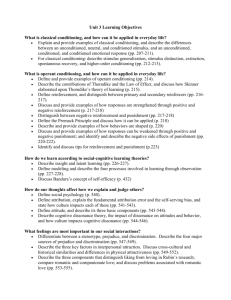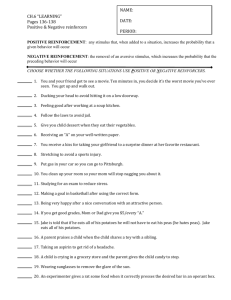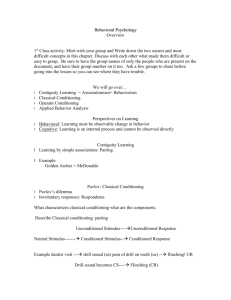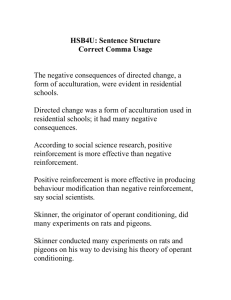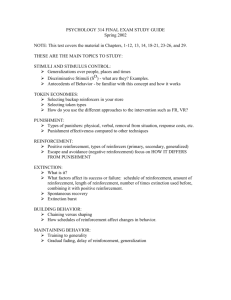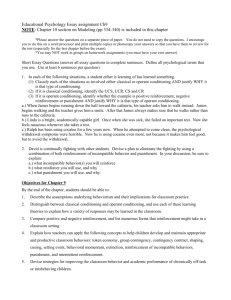Discipline & Behavior Management of Preschool Children
advertisement
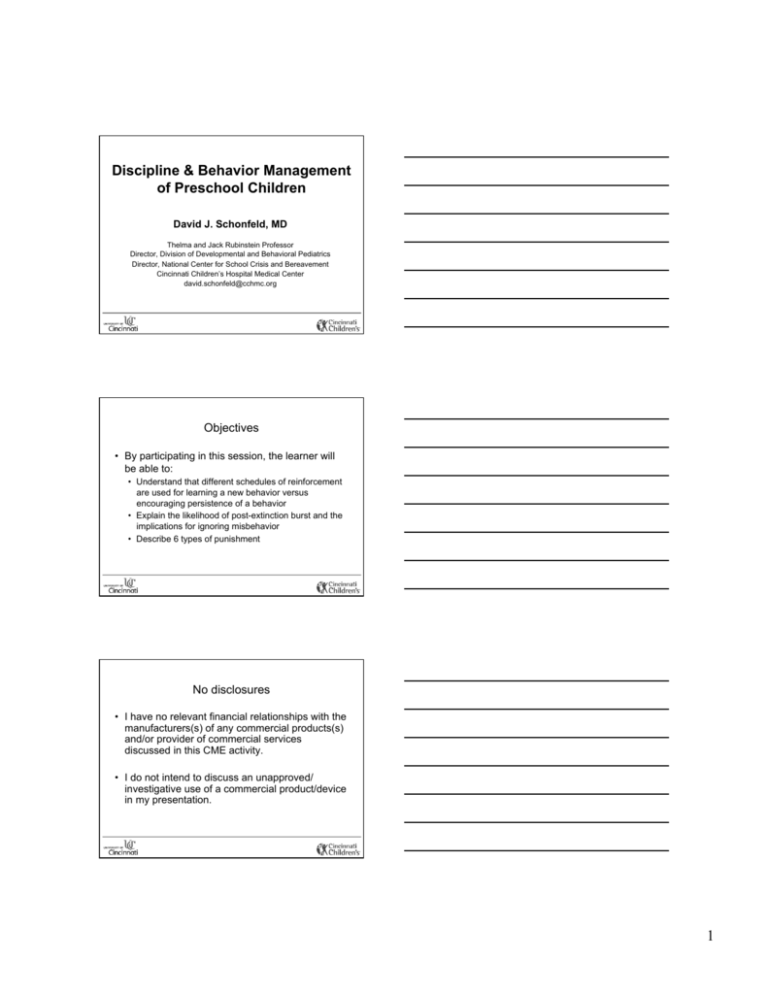
Discipline & Behavior Management of Preschool Children David J. Schonfeld, MD Thelma and Jack Rubinstein Professor Director, Division of Developmental and Behavioral Pediatrics Director, National Center for School Crisis and Bereavement Cincinnati Children’s Hospital Medical Center david.schonfeld@cchmc.org Objectives • By participating in this session, the learner will be able to: • Understand that different schedules of reinforcement are used for learning a new behavior versus encouraging persistence of a behavior • Explain the likelihood of post-extinction burst and the implications for ignoring misbehavior • Describe 6 types of punishment No disclosures • I have no relevant financial relationships with the manufacturers(s) of any commercial products(s) and/or provider of commercial services discussed in this CME activity. • I do not intend to discuss an unapproved/ investigative use of a commercial product/device in my presentation. 1 Multiple determinants of behavior in preschool children • Temperament • Cognitive Limitations • Generalizing salient characteristics of rule • Problem-solving is intuitive • Magical thinking and egocentrism • Language development • Parent influences ABC’s of Behavioral Modification A B ANTECEDENT BEHAVIOR C CONSEQUENCE Theories of conditioning • Classical Conditioning (Pavlov) • Involves respondent behavior • Focuses on antecedent of behavior • Operant Conditioning (Skinner) • Involves consequential behavior • Behavior is strengthened or weakened by events that follow 2 To encourage adoption of behavior • Ask child – Be explicit or may superstitions • To encourage adoption of complex behavior • Modeling • Shaping • Reinforcement should be contingent on behavior and occur immediately • The quickest way to establish a new behavior is to reinforce every time the behavior occurs Reinforcement to maintain behavior • Different schedules of reinforcement to maintain behavior: • Ratio schedule • Interval schedule • Fixed ratio or interval schedule may variable performance • Best way to achieve consistent and high-level performance is infrequent and random reinforcement To decrease frequency of behavior • Planned ignoring (Extinction) – consistent withholding of positive reinforcement (such as adult attention) • Post-extinction burst • Warning: Do NOT give reinforcement during postextinction burst (otherwise infrequent and random reinforcement that will make behavior far more persistent) 3 Post-extinction burst • Extent and duration will be greater if child has certain temperamental traits • High intensity • High task persistence • Parents’ ability to refrain from giving in depends on • • • • Situational context Emotional state Degree of supports Knowledge Recommend ignoring misbehavior? • You should not recommend ignoring misbehavior unless the parent understands what is likely to occur and is able to tolerate ignoring behavior • One other option is to reinforce incompatible behavior Types of punishment • • • • • • Time out Disapproval (not psychological cruelty) Natural consequences Logical consequences Behavioral penalty Physical punishment 4 Time Out principles • Withdrawing positive reinforcement for predetermined amount of time following occurrence of problem behavior – time out only works if there is quality “time in” • Best for serious, low-frequency problem behavior • If behavior functions to avoid or escape unwanted situation, then time out unlikely to be effective Time Out guidelines • • • • • • • Exclusionary time out best for 2-6 years of age Brief (1 minute per year of age) Give no more than one warning One phrase to give reason at beginning Brief explanation at end (no lecturing) Return to “time in” afterwards (no grudges) Only 1 or 2 target behaviors Physical punishment • Use very sparingly if at all – when other effective option not available AND seriousness of situation justifies use (e.g., very young children in life-threatening situation) • Physical punishment meant to humiliate, not hurt • Show parents something that works better – most people resort to physical punishment out of frustration and because overwhelmed – they would prefer not to use it 5 Possible practice changes As a result of participating in this session, I plan to apply the following change in my practice: • Provide parenting advice that incorporates information about principles of conditioning • Avoid recommending ignoring misbehavior until ensuring parent understands likely postextinction burst and appears able to implement successfully • Discusses alternatives to physical punishment with families 6


